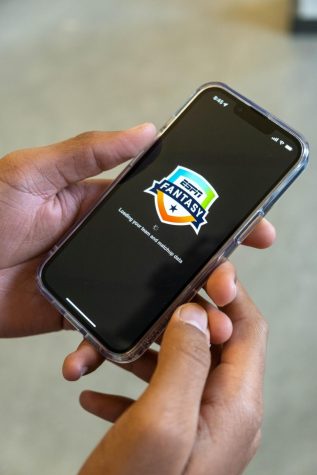Students build friendships through fantasy basketball
March 8, 2022

The ideal season comes down to the wire. Only 20 seconds remain in the head-to-head match. Nearly tied, the numbers on the scoreboard rise and fall. The blinding light from their phones flashes on their faces. The seconds tick down to the end.
In an instant, the last game ends. It’s over. The player won. The final score was separated by just a few points.
The rush of excitement washes over this student as a season of hard work has finally paid off. But this person is more glad to be able to compete with friends and make it to the end.
Every person who plays fantasy basketball wants their season to be as perfect as the hypothetical one above.
This intense scenario epitomizes the excitement participating in a fantasy basketball league brings, and the hopefulness of participating in one again.
U-High students participating in fantasy basketball have strengthened friendships and gained a conversation starter, as well as become more involved with sports.
Fantasy basketball works like other fantasy sports. Participants strategically draft at most 16 current NBA players to their team in a fantasy league against other members. The team’s performance is then based on the real-life performances of players in games, taking into account statistics such as points per game, rebounds, assists and steals.
According to junior Henry Koyner, who plays fantasy basketball with other U-high students, each week participants are pitted head-to-head against another team. Whoever has the most points at the end of the week wins. At the end of the season, the winner is determined by the team with the best winning percentage.
People can join a fantasy basketball league through Yahoo! Fantasy at age 13, the ESPN fantasy app if 16 or older or DraftKings, a fantasy sports betting app for those age 18 and older.
One of the most crucial moments in fantasy basketball is the draft at the beginning of the season. Although some select their players using an autopick draft, where players are distributed equally and automatically, many participants in fantasy basketball value the skill and strategy that comes with drafting players manually.
Ameya Deo, a junior, who participated in both fantasy basketball and football leagues, uses a specific strategy for drafting players to a team, which involves taking numerous factors into account to ensure an optimal lineup.
“Are there any trades happening? Is there any off-season signing that’s going on?” Ameya said. “And then once you have that, you should have a pretty good idea of maybe your first- or second-round pick of who you want and who you realistically think you’re going to get.”
Nathan Kilkus, a junior who plays fantasy basketball with other U-High students, said he recommends choosing underrated and undervalued players who can have a breakout year.
Although fantasy basketball certainly involves skill, Henry believes it is not necessary to follow sports closely or research players. Fantasy sports certainly do not need to be a large commitment.
“It’s really, like, you don’t have to be super into sports,” Henry said. “I certainly wasn’t, in the first couple of fantasy basketball leagues that I was in, where you sort of draft the team and you maybe set your lineups once a week, but otherwise, it’s very low commitment.”
Even if you do not have a large interest in basketball, William Meyer, a junior who is also in a fantasy basketball league with other U-High students, appreciates how fantasy sports can bring people together and spur conversation.
“It’s just something that we can all do together, it’s something that you can talk about with people,” William said. “If you don’t know what to talk about you can always bring up your fantasy team and talk about how your players are performing. It’s a shared value that you are able to connect with people about.”



























































